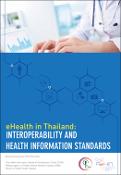บทคัดย่อ
Interoperability of different health information systems is one of the major
challenges for countries to develop functional, integrated and effective health
information systems. It is evident that the lack of uniform data standards will
lead to information fragmentation. Interoperability of information systems
needs the whole stack of standards which include content, syntactic, semantic
and security standards.
This report provided fundamental knowledge of health information standards
and interoperability and also explored and reviewed the development, adoption
and use of health data standards in Thailand. Thailand has developed, adopted
and implemented some health data standards such as the citizen ID system,
the health provider facility ID system, standard data sets for reporting and
insurance reimbursement systems, and the International Classification
of Diseases (ICD). However, the current standards are not adequate. To
support information exchange of administrative and clinical data, and
Electronic Health Record (EHR), Thailand needs more health data standards.
The demands of containing healthcare cost by the government led to the
development of health data standards that can identify healthcare resources
and analyze their utilization. Thai Health Information Standard Development
Center (THIS), responds to the demands by researching and developing two
semantic standards, the Thai Medicines Terminology (TMT) and Logical
Observation Identifiers Names and Codes (LOINC). The development of
TMT and the adoption of LOINC aim to facilitate the EHR interoperability in
Thailand. The standards that can support both administrative functions and
also health information exchange for clinical and quality of care. TMT is
currently implemented in Thai insurance reimbursement information systems
and the government e-procurement information system. LOINC, a widely use
international standard, has been studied for the plausibility of adopting the
standard in Thai healthcare service context. The study shows that LOINC can
be used and should be adopted in Thailand.Though health informatics professionals in Thailand have encouraged
the adoption of health data standards, there are barriers such as a
lack of human resources in health informatics, lack of awareness
and unfamiliarity with the potential benefits of using standards and
terminologies in healthcare among high level policy makers and
healthcare professionals. With these barriers in mind, we recommend
the following steps for the development of health information standards
in Thailand:
• Governance and leadership of national eHealth systems are
essential and critical for the country to achieve interoperability
through health data standards.
• Incentives and mandates from the governing body that has
authority are important to the adoption of standards.
• Standards maintenance process is a necessary component of
successful implementation of every standard.
• Advocacy on the potential benefits from using data standards
as well as communication between the organizations and the
users are of importance.
• Human resource in health informatics is an important
component and building capacity for them is essential.


